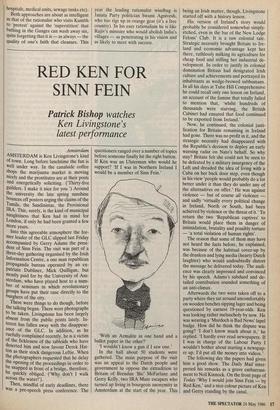RED KEN FOR SINN FEIN
Patrick Bishop watches
Ken Livingstone's latest performance
Amsterdam AMSTERDAM is Ken Livingstone's kind of town. Long before lunchtime the fun is well under way. In the canalside coffee shops the marijuana market is moving nicely and the prostitutes are at their posts and energetically soliciting. (`Thirty-five guilders. I make it nice for you.') Around the university the late spring sunshine bounces off posters urging the claims of the Tamils, the Sandinistas, the Provisional IRA. This, surely, is the kind of municipal naughtiness that Ken had in mind for London, if only he had been granted a few more years.
Into this agreeable atmosphere the for- mer leader of the GLC slipped last Friday accompanied by Gerry Adams the presi- dent of Sinn Fein. The visit was part of a three-day gathering organised by the Irish Information Centre, a one man republican propaganda bureau operated by an ex- patriate Dubliner, Mick Quilligan, but mostly paid for by the University of Am- sterdam, who have played host to a num- ber of seminars in which revolutionary groups have put their case directly to the burghers of the city. There were things to do though, before the talking began. There were photographs to be taken. Livingstone has been largely absent from the public prints lately. In- terest has fallen away with the disappear- ance of the GLC. In addition, as he ruefully complained recently, he is a victim of the fickleness of the tabloids who have deserted him and now favour Derek Hat- ton as their stock dangerous Leftie. When the photographers requested that he delay the opening of the proceedings in order to be snapped in front of a bridge, therefore, he quickly obliged. ('Why don't I walk across the water!'). Then, mindful of early deadlines, there was a pre-speech press conference. The questioners ranged over a number of topics before someone finally hit the right button. If Ken was an Ulsterman who would he support? 'If I was in Northern Ireland I would be a member of Sinn Fein.'
`With an Armalite in one hand and a ballot paper in the other?'
`I wouldn't know a gun if I saw one.'
In the hall about 50 students were gathered. The main purpose of the visit was an appeal to the Dutch people and government to oppose the extradition to Britain of Brendan 'Bic' McFarlane and Gerry Kelly, two IRA Maze escapers who turned up living in bourgeois anonymity in Amsterdam at the start of the year. This being an Irish matter, though, Livingstone started off with a history lesson.
His version of Ireland's story would probably be considered somewhat simply- etched, even in the bar of the New Lodge Felons' Club. It is a raw colonial tale. Strategic necessity brought Britain to Ire- land and economic advantage kept her there, ruthlessly milking its agriculture for cheap food and stifling her industrial de- velopment. In order to justify its colonial domination Britain had denigrated Irish culture and achievements and portrayed its inhabitants as wedge-browed subhumans. In all his days at Tulse Hill Comprehensive he could recall only one lesson on Ireland, an account of the famine that totally failed to mention that, 'whilst hundreds of thousands were starving, the British Cabinet had ensured that food continued to be exported from Ireland.'
Now, he continued, the colonial justi- fication for Britain remaining in Ireland had gone. There was no profit in it, and the strategic necessity had disappeared with the Republic's decision to deploy an early warning radar on Nato's behalf. So why stay? Britain felt she could not be seen to be defeated by a military insurgency of the Left and dreaded the idea of living with a Cuba on her back door step, even though in his view 'people would probably do a lot better under it than they do under any of the alternatives on offer.' He was against violence — but of course all violence and sadly 'virtually every political change in Ireland, North or South, had been achieved by violence or the threat of it.' To return the two 'Republican captives' to Britain would place them in danger of intimidation, brutality and possibly torture — 'a total violation of human rights'.
The reason that some of them may have not heard the facts before, he explained, was because of the habitual cover-up by the drunken and lying media (hearty Dutch laughter) who would undoubtedly distort the message he delivered today. The audi- ence was clearly impressed and convinced by his speech. Adams's subdued and de- tailed contribution sounded something of an anti-climax.
Afterwards the two were taken off to a party where they sat around uncomfortably on wooden benches sipping lager and being questioned by earnest 19-year-olds. Ken was looking rather melancholy by now. He was wearing a 'Murdoch is Bad News' lapel badge. How did he think the dispute was going? 'I don't know much about it,' he replied. 'I hardly ever read newspapers. If I was in charge of the Labour Party I wouldn't bother about starting a newspap- er up. I'd put all the money into videos.'
The following day the papers had given him a good show. The Daily Mail inter- preted his remarks as a grave embarrass- ment to Neil Kinnock. On the front page of Today 'Why I would join Sinn Fein — by Red Ken,' and a nice colour picture of Ken and Gerry standing by the canal.














































 Previous page
Previous page